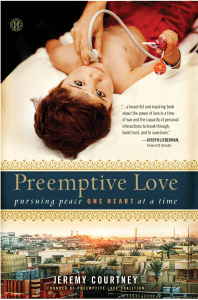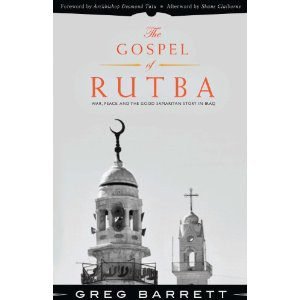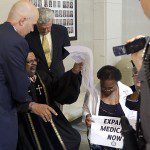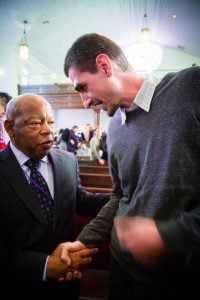 After 9-11, the concept of preemptive war to prevent mass terror became known as “the Bush doctrine.” I went to Iraq and witnessed the collateral damage of this approach for myself. A few years later, after I’d spoken about Iraq at a church in Santa Barbara, CA, I met Jeremy Courtney. Jeremy told me about his work to help kids in Iraq get heart surgeries. Then he started talking about “preemptive love.” He wasn’t just doing good work. He was learning from the work something about how God engages us. I liked Jeremy’s way of turning a phrase. It seemed to me he was articulating the Jesus doctrine.
After 9-11, the concept of preemptive war to prevent mass terror became known as “the Bush doctrine.” I went to Iraq and witnessed the collateral damage of this approach for myself. A few years later, after I’d spoken about Iraq at a church in Santa Barbara, CA, I met Jeremy Courtney. Jeremy told me about his work to help kids in Iraq get heart surgeries. Then he started talking about “preemptive love.” He wasn’t just doing good work. He was learning from the work something about how God engages us. I liked Jeremy’s way of turning a phrase. It seemed to me he was articulating the Jesus doctrine.
Last week, I got a copy of Jeremy’s new book, Preemptive Love: Pursuing Peace One Heart At A Time. “A beautiful and inspiring book about the power of love in a time of war,” says former US Senator Joseph Lieberman. I love a story that can get folks on Capital Hill talking about the power of love. And I’m grateful to Jeremy for taking the time to talk with me about his new book.
How did you and your family end up in Iraq? What did you think you were going there to do?
My family and I were living in Istanbul, Turkey, and we wanted to move into the eastern part of the country to serve marginalized people—women, in particular. For various reasons, that didn’t pan out. Then I got a call from a friend living in a volatile, fault-line Iraqi city inviting me to come out for a visit. Fast-forward a few months, and our family was now living in Iraq with a few friends. I worked with war widows for another nonprofit, but that was about to change.
 How did you end up facilitating heart surgeries?
How did you end up facilitating heart surgeries?
I was actually working for this other development group. I was in a hotel cafe, working on a grant proposal or something like that, when I met a man whose daughter had a life-threatening heart defect. He brought her in, and I was a goner! She reminded me too much of my little girl for me to say “no” to his plea for help.
And the more I sought help for this little girl, the more I realized she was not alone—there were thousands of kids like her across the country waiting in line for these lifesaving heart surgeries. We’ve been working to serve these children ever since.
You write honestly about how you almost wrecked your marriage as a young activist. What has marriage taught you about how to love well? What has your work with kids and their families in Iraq taught you about how to be a good husband?
Marriage has taught me the value of making sacred promises—commitments that sustain us, dragging us forward into the future, kicking and screaming, when we would otherwise turn tail and run the other way. More specifically, my wife has taught me the meaning of grace, of forgiveness, and of perseverance. I’ll let the book elucidate this a little more, but it is her long-suffering patience with me that stands as one of the greatest testaments of God’s kindness in our story.
As for working with these children and their families as they face down death each day, it has taught me that childhood is not something that we can afford to take for granted. I either see or hear stories about young kids dying in Iraq every day. I’ve held these kids after they’ve died. More often, I’ve held their parents. And every time I’ve come home and kissed my kids longer and hug them all longer than I did the day before.
Our work makes me own up to my own mortality, as well. Even as the death around us urges me to work harder and longer, it also reminds me to slow down and enjoy the life we have; to be present to my family and friends and to savor today as the “good ol’ days” that I will soon be longing to do all over again.
People often ask what it will take to have peace in Iraq. What do you say?
I would say that there will ultimately be peace in Iraq—I have no doubt of that. I believe God will—and currently is—making all things new, and that includes countries like Iraq. Perhaps even especially countries like Iraq! But I’m sure the more immediate question is how? And to what extent could that happen right now?
That’s a simple question with an impossibly complex—and even bluntly offensive—answer. The great powers of the world have puppeted Iraq into compliance for well over a century, exploiting her resources and strategic location for their own gain. That, coupled with the Iraqi people espousing a sectarian worldview that involves demonization and bigotry, makes peace impossible.
That will all have to stop. People will have to embrace a love-first way of living over a my-country-first, my-tribe-first, or a my-family-first way of living, and that kind of living comes from GOD in Christ.
Do you see people applying the principle of “preemptive love” in other contexts? What might it look like in an American city? Or in the suburbs?
Oh, I see it everywhere I go. I’ve been privileged to hear stories of sacrificial love from soldiers and civilians—children and adults—all over the world. They may not even realize they’re doing it, or they may word it differently, but “preemptive love” is there.
In its simplest form, it is coming home from a terrible day at work and choosing to do the dishes before anyone else can. It is walking across the street to the new family who might look scary because they appear so different from you. Preemptive love is not only leaving the suburbs for the ghetto, but, for some of us, learning to be as gracious with “our own people” as we learned long ago to be with various outcasts and “others”.
In short, preemptive love ranges from the extreme to the mundane. It is a qualitative “posture” or character of living, not a set of actions to be measured against others.











